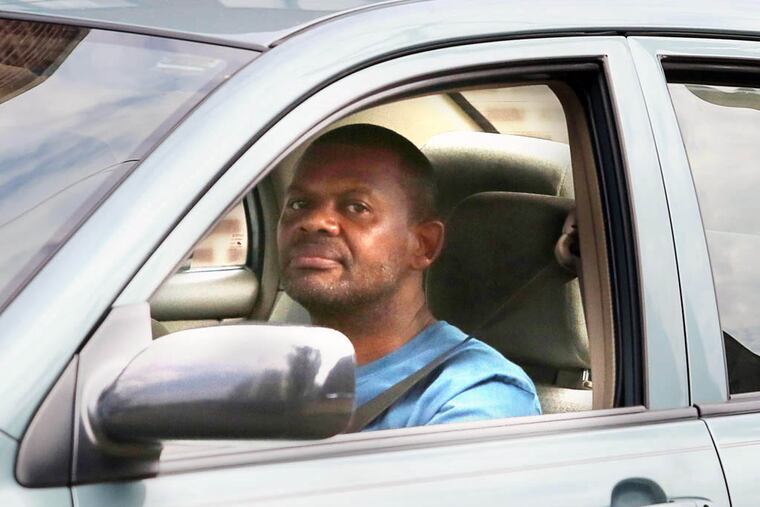Meet the king of overtime and his 20-hour days
Newly released city records show a health department custodian worked superhuman hours last year.

Another report in a series examining the rampant use of overtime in Philadelphia government.
IS VAL BARKLEY the hardest working man in Philadelphia?
A janitor for the city's Health Department, Barkley in 2013 became the king of overtime among city workers.
He logged more hours in 2013 than any other city employee - gobs of overtime were brought to light in April in a Philly.com report on rising city OT.
After the Philly.com story and records requests, the Health Department revised the way it handles overtime.
But the city has only now released Barkley's time sheets. An analysis of the records suggests a near superhuman amount of overtime by Barkley. It also shows that he got overtime almost 100 times without approval by a supervisor.
During the year, Barkley, 57, averaged an 89-hour workweek, routinely logging many hours to "superclean" health buildings, work security details and help out with information technology. He also served as a driver for the city's Division of Disease Control.
Barkley's usual shift at Health Center No. 6 on Girard Avenue runs from 3 to 11:30 p.m., for which he is paid a base salary of $27,900. But all those extra hours allowed him to boost his income by more than 200 percent last year: an additional $58,578. His total earnings reached nearly $86,500.
Barkley's banner year serves as a high-water mark of what's become a city trend. During the past five years, overtime given to city workers has grown by nearly 20 percent. In 2009, the city paid out $166 million in OT. Last year, the total grew to $199 million.
A Philly.com analysis of the time sheets and overtime approvals for 2013 show that Barkley logged 20 or more hours in a single day on 60 occasions. On 17 occasions, he worked 20-hour days consecutively.
None of these feats of endurance raised concern within the Health Department or at City Hall, despite that Barkley submitted 96 overtime-approval slips without a supervisor's signature, the analysis found.
"We looked into the work he was asked to do and we never found anyone to say he didn't do the work," Deputy Health Commissioner Kevin Vaughan said.
Vaughan said the Health Department has overhauled its overtime rules to require more stringent approval, though the effect of the changes won't be apparent until the end of the year, though he said the effect of the changes have not materialized yet.
The citywide growth in overtime spending is the result of a strategy by the Nutter administration to control personnel costs by reducing the number of employees.
But finance officials and department-level managers have never been able to point to an actual analysis of effects that the increased overtime spending has on the city's budget.
"The city has unfortunately made the decision to use OT instead of hiring staff they need," said Evon Sutton, business manager for District Council 33's Local 488, which represent city custodial workers, including Barkley. "Right now in the Health Department, we're short custodial workers. . . . They have not hired a soul."
The department said it would hire additional workers after Philly.com first inquired in late March about Barkley's massive overtime log, along with those of other custodians who banked large amounts of overtime on the city taxpayers' dime.
Four months later, it has not.
However, Vaughan said his department has begun watching overtime much more closely. Supervisors can no longer approve overtime for subordinates unilaterally.
Several people signed off on Barkley's overtime-authorization slips, the analysis found, but a large majority of the approvals were signed by two people. One is his direct supervisor, Delano Frederic Jr. The other is an employee in the director's office at Health Center No. 6, Sharon McAfee.
Frederic also was a big beneficiary of work needed from the Health Department's understaffed custodial unit. He collected more than $50,000 in overtime in 2013 on top of his $33,489 base salary. Together with Barkley, the two reaped a total of $434,000 in overtime from 2009 to 2013.
Several efforts to reach Frederic for comment were unsuccessful. A security guard at the Health Department's administration building on South Broad Street where Frederic is based said last week, "He's in and out."
Frederic signed off on overtime for Barkley 118 times in 2013, including many of his Saturday and Sunday shifts that were described on approval forms as a "superclean" at various facilities.
McAfee, who approved overtime for Barkley 89 times, was not available to comment, Health Center No. 6 director Chanel Conley-Wright said.
McAfee often gave Barkley overtime as a "driver for DDC," or the Division of Disease Control, including numerous shifts on days when Barkley eventually logged 20 or 21 hours within a 24-hour period.
Vaughan said direct supervisors are no longer allowed to both assign and approve extra hours.
"Those are practices we don't have anymore," he said.
On two recent afternoons, as Barkley showed up for his regular shift at Health Center No. 6, he ignored a reporter's request to talk.
In March, he gave a brief interview, but repeatedly declined to talk about how he managed to work so many hours: "How, what, when is not anyone's business. That's personal."
To at least one co-worker of Barkley, working all those hours is enviable. A security guard at the health center said Barkley, who lives in Mount Airy, is single and doesn't have any children.
"He's able to do that many hours, probably, because he doesn't have anyone he's responsible for," the guard said. "I wish I could work all those hours."